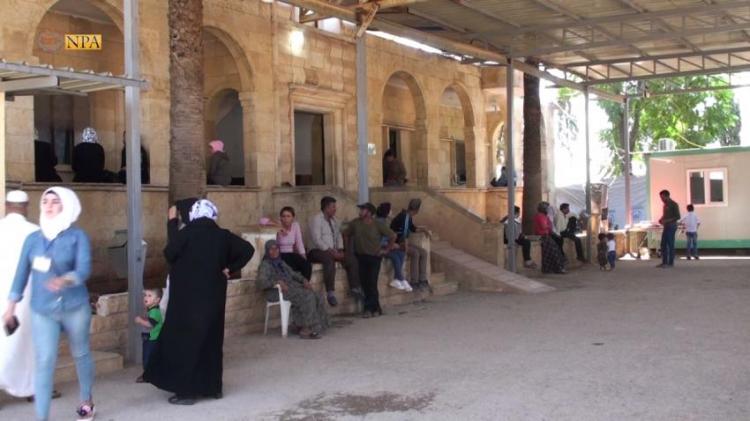Afrin’s IDP hospital receives monthly thousands displaced patients
Northern Aleppo – North-Press Agency
Dejla Khalil
“Avrin” Hospital in the town of Fafin in the northern countryside of Aleppo suffers a shortage of specialized medical staff and medical equipment, such as the computed tomography scan (CT Scan), and medical analysis devices, in addition to the lack of quality medicines, which loads a heavy burden on the shoulders of the patients.
Avrin Hospital is the only hospital in the northern countryside of Aleppo, which provides medical services to the displaced people of Afrin in that region, where it receives 800-900 cases in all suites every day.
Suites
Although the hospital includes more than 12 suites of gynecology, pediatric and internal diseases, in addition to laboratory, radiography, operating rooms and intensive care rooms, but it lacks many specialties such as neurology, skin, psychological and dental diseases.
The hospital received 23.256 different cases last month among which are seeing, previewing and operations, according to Dr. Osman Sheikh Issa, the chairman of the Board of Directors of Avrin Hospital.
Sheikh Issa pointed out that the hospital suffers “great pressure and a severe shortage of medicines and the medical staff to cover these large numbers of patients”, noting that the NGOs such as the Red Cross and others who visit the hospital from time to time “don’t provide any services for the hospital”.
Sheikh Issa noted that the serious cases are being treated in the city of Aleppo, pointing out that “there is a great harassment by the Syrian government forces in creating difficulties for the patients when they go to Aleppo, where they close the road occasionally, so the patients have to wait several days until the road is reopened”.
The Syrian government checkpoints prevent the exit of the displaced people of Afrin to go to Aleppo for treatment.
In this context, Sheikh Issa said that there are patients who lost their lives as a result of the closure of the road and the lack of permission to enter Aleppo, calling on the international and local organizations to provide assistance for the hospital as “the northern countryside of Aleppo is under siege”.
Sheikh Issa added: “We have one ambulance with permission to enter the city of Aleppo, which isn’t enough for the numbers of the patients”, pointing out that they tried to get permission for another ambulance for serious cases, but their request was rejected by the government’s security authorities.
Waiting queues
The patients are forced to come to the hospital early and to wait for their turn, which is an additional burden on them, making the case of some of them worse.
“I have been here since the morning, waiting for my turn, my card number is 53, it is so busy, and waiting for long hours worsen my situation”, said Mawlida Sheikho, a displaced woman from Afrin who had been waiting in the hospital for several hours.
Lack of medications
Some patients whose medications aren’t available in the hospital, are forced to buy them from Aleppo, which creates an additional burden and increases their suffering.
In this context, Aytan Juma Hussein who is a patient, said: “My entire prescription isn’t available at the hospital, so I have to buy it from Aleppo, which is expensive”, pointing out that “the hospital provides all its services for the patients”.
The one-pack of medicine which Hussein buys from Aleppo, and where she often waits several days to arrive, costs about SYP 6.000, “I’m a displaced person from Afrin and I don’t have the financial ability to buy the medicine from Aleppo”, she said.
For her turn, Zaloukh Suleiman, who was accompanying her baby grandson at the hospital, said that the lack of adequate equipment, devices and medicines had “worsened my grandson’s condition day after day”.
Afrin displaced people in the camps of the northern countryside of Aleppo suffer difficult living conditions in light of the absence of the role of the humanitarian organizations, where about 350 thousand people from Afrin were displaced during Turkey’s military assault along with the Syrian armed opposition groups against the Kurdish region of Afrin region in March 18th, 2018 after nearly two months of fighting against People’s Protection Units (YPG).

